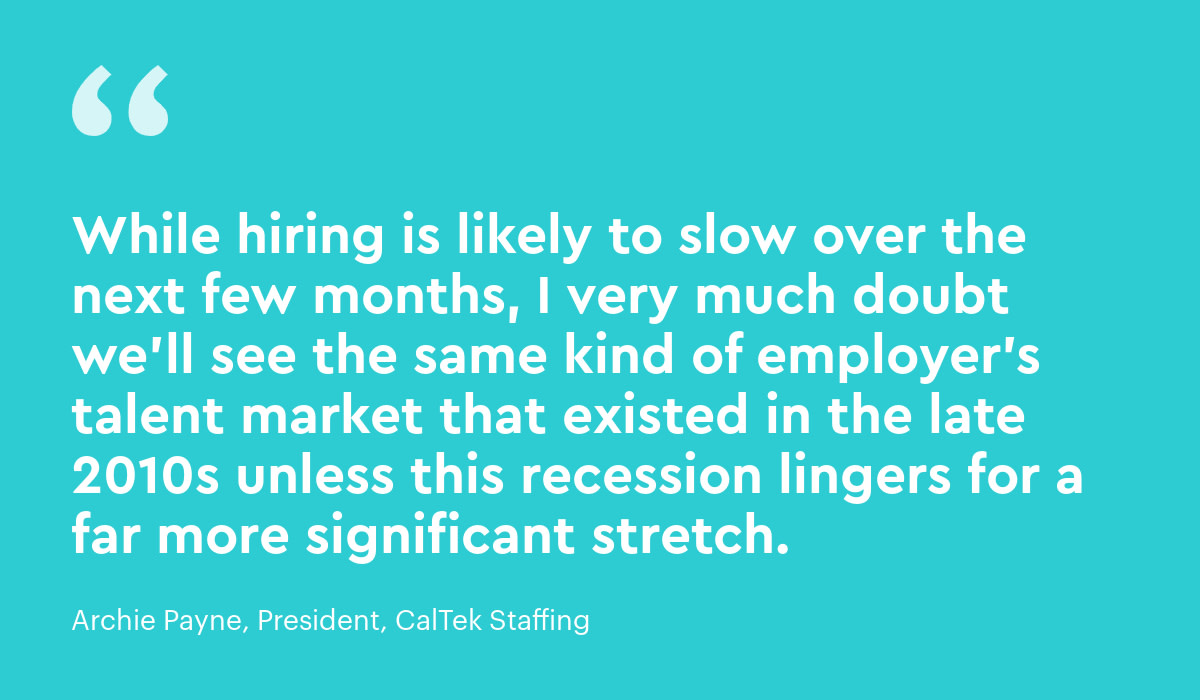Will an Upcoming Recession Shift Power Back to Employers?
The possibility of an upcoming recession has some employees staying put at their jobs, but this balance of power varies across industries.

Since the pandemic, employees across many sectors have had an edge as companies struggled to find qualified staff to fill open positions. The news cycle these days, though, seems to be cluttered with conflicting reports of the state of the workforce and the economy. While reports still circulate about the “Great Resignation” and some employers continue to be challenged to fill open jobs, there are also reports of massive layoffs at tech giants like Amazon, Meta, and Twitter.
Yet as top media outlets report on these massive layoffs, others—at the same time—continue to lament talent shortages. InformationWeek, for instance, recently reported on the promise that apprenticeships may hold for “solving the American tech talent shortage.”
What’s going on?
Well, it’s complicated. You see, the possibility of an upcoming recession isn’t created equal across geographies, industries, and even companies.
A global outlook on the upcoming recession
According to The New York Times: “The International Monetary Fund, which downgraded its growth outlook last month, expects global output to remain sluggish this year and in 2023. In its latest projections, the I.M.F. forecast the global economy to grow 3.2 percent this year and to slow to 2.7 percent in 2023. China’s growth appears to have stalled. Countries like Britain are already entering a recession, economic data suggest.”
The top four economies, according to Business Insider India are the United States, China, Japan, and the UK. Even these countries, though, are fearing the impact of a recession.
Tech industry could be more at risk than others
Despite much discussion about tech industry job losses, even in the technology industry staffing needs and situations vary. Technology, after all, is a huge sector employing people with a wide range of skills and competencies.
As Archie Payne, president of CalTek Staffing, a recruiting firm that works with TI and engineering talent says, “The recent highly-publicized layoffs by large companies are more than balanced by unfilled positions elsewhere in the industry, and while hiring is likely to slow over the next few months, I very much doubt we’ll see the same kind of employer’s talent market that existed in the late 2010s unless this recession lingers for a far more significant stretch.” The current situation, he says, “is also unbalanced, with consumer spending overall still fairly healthy and some sectors continuing to grow despite the economic difficulties.”

Source: Archie Payne, President, CalTek Staffing
While layoffs in the tech sector have been big news recently, other industries are still struggling to find talent and experiencing volatility and turnover.
Quits continue in hospitality, decline for UK employees
The hospitality industry has been especially hard hit during the pandemic and still struggles to find qualified and reliable workers. According to the Bureau of Labor Statistics (BLS), the sectors with the highest quit rates (number of quits during the month as a percent of total employment) in September 2022 (compared to September 2021) were:
Accommodation and food services (from 6.0 to 6.2%).
Leisure and hospitality (from 5.7 to 5.8%).
Retail trade (from 4.3 to 3.7%), which is seeing some decline.
Transportation, warehousing, and utilities (from 2.7 to 3.6%)
But even among employers in sectors and organizations with lower quit rates, concerns exist. In the UK, for instance, 81% of Brits indicate that they plan to stay with their current employers as they ride out the recession (this even though 46% admit that they’d like to change jobs).
Keep employees engaged for when the recession risk is over
Recruitment, retention, and engagement are all important as organizations strive to remain competitive and maintain a strong bottom line in volatile economies. Even employers in labor markets where the tide is turning to potentially favor employers need to be alert to the threat of disengagement and its impact on productivity—and profits.
Just because employees aren’t poised to leave, at least for now, doesn’t mean they’re entirely committed to their work. Workers in the UK, for example, admit that they “would rather quietly quit than risk financial insecurity.”
Does this mean that employees still do have the upper hand? If they do, many may not know it.
A survey conducted by Insight Global, a national staffing company, revealed that of 1000 job seekers around the country, 75% passed on applying to their dream jobs because they lacked career confidence and 31% said they are intimidated by the job search.
That may represent an opportunity for employers to better engage existing staff to minimize both turnover and the “quiet quitting” trend. The workforce today has had a taste of freedom and flexibility during the pandemic that they had never previously experienced. They’re challenging the status quo of the pre-pandemic workforce and demanding flexibility in when, where, and how they work.
For employers that means the need for continued vigilance even as shifts in the labor market seem to favor the ability to readily fill open slots.



